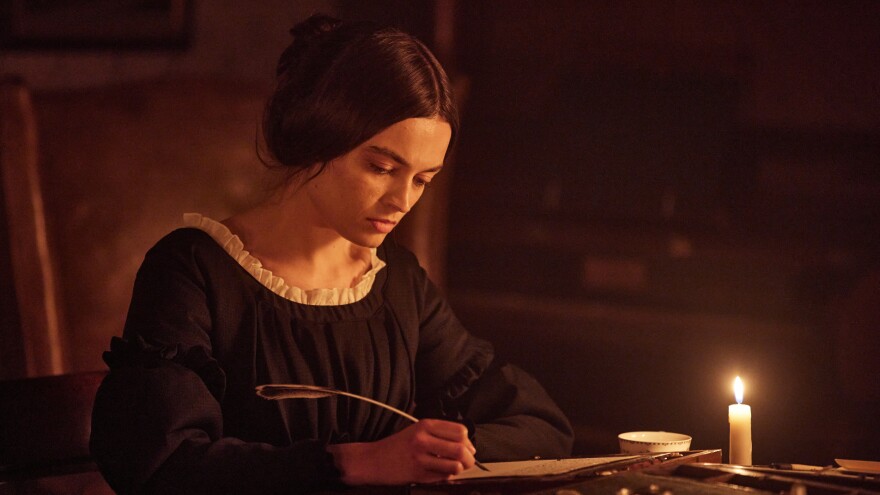Given that there are few activities less inherently cinematic than writing, I'm surprised and heartened by how many good movies I've seen in recent years that have convincingly entered the lives and minds of authors. I'm thinking of A Quiet Passion, the Emily Dickinson biopic, and Shirley, about The Haunting of Hill House author Shirley Jackson. You don't spend a lot of time watching these women scribbling with their quills or banging away at their typewriters, but you do get a rich sense of how their artistic sensibilities came into being.
The latest fine addition to this group is Emily, which freely speculates about the life of the 19th-century English writer Emily Jane Brontë in the years before she would write her one and only novel, Wuthering Heights. The movie takes significant liberties with what is known about Emily and her famous sisters, Charlotte and Anne, but as a non-stickler for biopic accuracy, I didn't mind. True or false or somewhere in between, this is an engagingly detailed and emotionally truthful portrait of a family of artists. Every character and actor leaves a vivid impression.
Emily is strikingly played by Emma Mackey, the French-British actor known for her work on the series Sex Education; she was also the best thing in the recent remake of Death on the Nile. Mackey has the kind of searing gaze that cuts right through any period-piece decorum, and that makes her perfect for the sardonic, self-amused Emily. She's neither as sweet as her younger sister, Anne, nor as well behaved as her older sister, Charlotte, who's memorably played by Alexandra Dowling. Charlotte is studying to be a teacher and wants Emily to do the same, mainly to please their strict clergyman father.
But Emily's natural talent is for inventing stories and writing poetry, and also for speaking her mind with a boldness that leaves others unsettled. There's a dark side to Emily, and it emerges whenever she mentions her mother's long-ago death, something the others don't like to talk about.
Of all her siblings, Emily is probably closest to her fellow-misfit brother, Branwell, an aspiring painter played by Fionn Whitehead. Their bond becomes even stronger after Branwell drops out of art school and sinks into alcoholism and opium addiction. One day, while they're walking the Yorkshire moors, she notices three words inked on his arm: "Freedom in thought" — a creed that also becomes her own.
And so Emily tells a familiar but compelling story of a woman rebelling against the expectations of her religious and image-conscious family. In her biggest breach of convention, she falls into a torrid romance with William Weightman, the handsome young curate who assists her father in his church duties.
Emily and William, played by Oliver Jackson-Cohen, initially loathe each other, which makes it all the more affecting when they surrender to their passion. Their affair is clearly laying the narrative framework for the forbidden love between Catherine and Heathcliff in Wuthering Heights.
That idea might sound overly simplistic, especially if, like me, you chafe at the notion that great art can only emerge from direct autobiographical experience. But even if the movie plays hard and loose with the facts — some have speculated that there was a romantic connection between Anne Brontë and William Weightman — Mackey and Jackson-Cohen bring so much heat and conviction that their love story sweeps you up in its wake.
But as magnetic as Emily and William are together, their bond isn't the only one of note here. I've rarely seen a movie this attuned to the emotional complexity of sibling relationships, especially between Charlotte and Emily, whose mutual exasperation never obscures the depths of their sisterly love.
Emily marks an excellent writing and directing debut for the actor Frances O'Connor, who's appeared in her own share of English literary adaptations like Mansfield Park and The Importance of Being Earnest. Her witty but unfussy script is rife with echoes of Wuthering Heights, which means it often plays like a ghost story. Much of the movie is set in dim, candlelit interiors, including one terrifying scene in which an innocent game among the Brontë siblings becomes a disturbing kind of séance. O'Connor keeps her camera tightly fixed on Emily even at her most anguished moments, when she seems to be teetering on the brink of madness. Maybe she is. But maybe it takes a little madness to create a work of art, including a movie as good as this one.
Copyright 2023 Fresh Air. To see more, visit Fresh Air.








